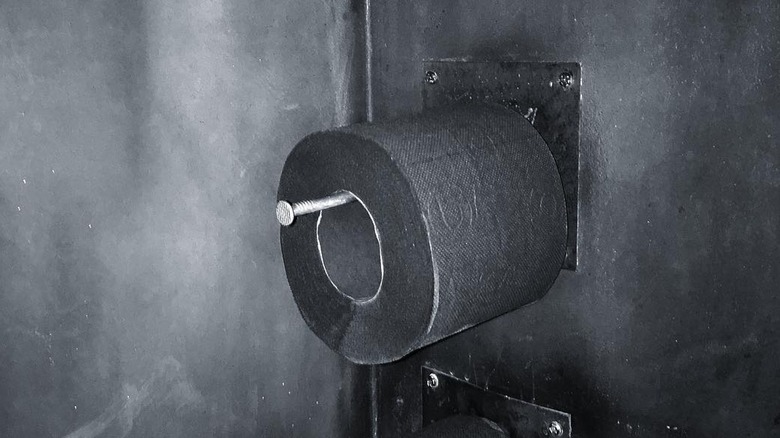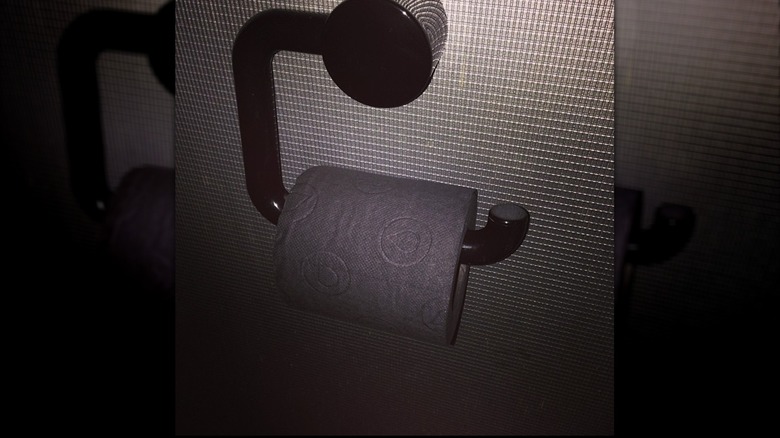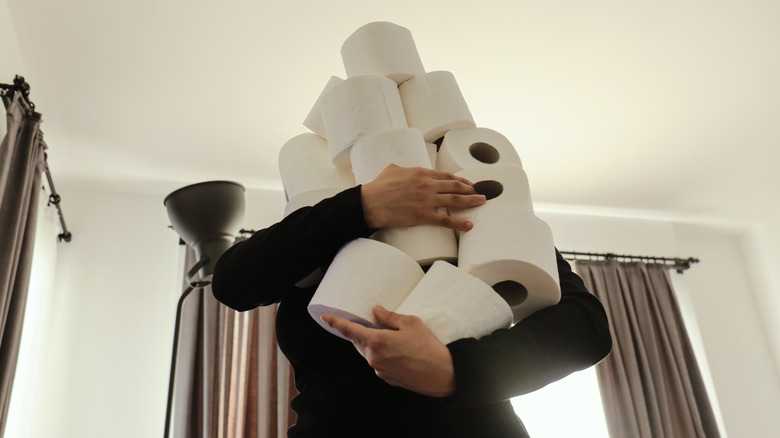Is There A Purpose Behind The Black Toilet Paper Trend? Here's What We Know
We may receive a commission on purchases made from links.
The greatest necessity known to humans came about during sixth century China. Yes: toilet paper. Could you imagine a world without it? Beyond being the bestselling household paper product in the U.S., it's had its fair share of phases. Ply, bamboo, unbleached, and even tree-free toilet paper have made their way around bathrooms across the world. So, of course, we've seen plenty of options on our local store shelves. Black toilet paper, though, is pretty new to us.
One Reddit user posted an image of black toilet paper hanging from their roommate's tissue dispenser, and as you can imagine, it received an overflow of comedic relief from readers. One commenter said, "There goes my annual mummy costume," while another replied, "Black toilet paper: where every wipe is a Ghost Wipe." Frequently hilarious and sometimes jaw-dropping, the concept of black toilet paper has been somewhat of a mystery to many. Though toilet paper hasn't always been white (it actually got this color in the 1950s), it's still a bit jarring that something could be so opposite of our norm. Where did this black variation come from? Could it really be beneficial for any of us?
Let's dive into black toilet paper
Curious when black toilet paper was introduced? The darkest wipe burst onto the scene in 2005 and was the invention of a Portuguese company called Renova. This creation quickly gained momentum across Europe, being called luxurious and a status booster, and now many celebrities are using it instead of traditional white toilet paper. Why? Well, nobody really knows. Black toilet paper isn't measured by normal toilet paper expectations, like ply count or those cute little patterns we all know and love (a special shoutout to Charmin's new Smooth Tear toilet paper). Made from 100% virgin pulp and dermatologist-tested dyed pigments, this is simply a high-end fashion accessory all about surprising your guests.
The product's allure is its most fascinating attribute, and it aims to evoke a feeling of boldness even in the smallest pockets of our lives. However, if you're in the market for toilet paper that's a bit more soothing and comfortable, it may be for you, as Renova often infuses its rolls with aloe vera or charcoal. It's even said to be softer than most regular brands of white toilet paper. However, black toilet paper is more expensive than more traditional rolls. For example, a six-pack of black toilet paper on Amazon costs around $15, compared to $12.50 for a 16-pack of standard white paper on the same website. Do consider the price if you want to spend less on toilet paper.
Is it worth making the switch?
Tyler Schoeber put the toilet paper to the test and wrote about the experience for Yahoo Finance. Upon first glance, his initial reaction was that the toilet rolls were extremely skinny but felt normal. His only concern was an obvious one: Where's the tell-tell sign that you're done wiping? "Black toilet paper has what we might call a diminished diagnostic function," Schoeber said. "I just wipe a little extra when using black toilet paper, just in case." If you're a looker, this one may not be for you. And if you want to protect the planet, it may not be for you either.
With a surge of environmentally friendly tissue options, consider switching to bamboo toilet paper since it's a renewable resource that doesn't need as much water or pesticides as regular trees. Black toilet paper, on the other hand, may be funneling these chemicals into the environment. The carbon footprint may also be a bit higher than other brands, and that says a lot considering many already have high carbon emissions. Any type of colored paper takes longer to disintegrate, so keep that in mind when you're buying your next roll.
Our answer? Maybe. Black toilet paper isn't just an addition to the toilet paper genre — it's in an entirely different category. With high market profits, this invention just goes to show that a little bit of gall can leave a lasting impression on everyday necessities.


